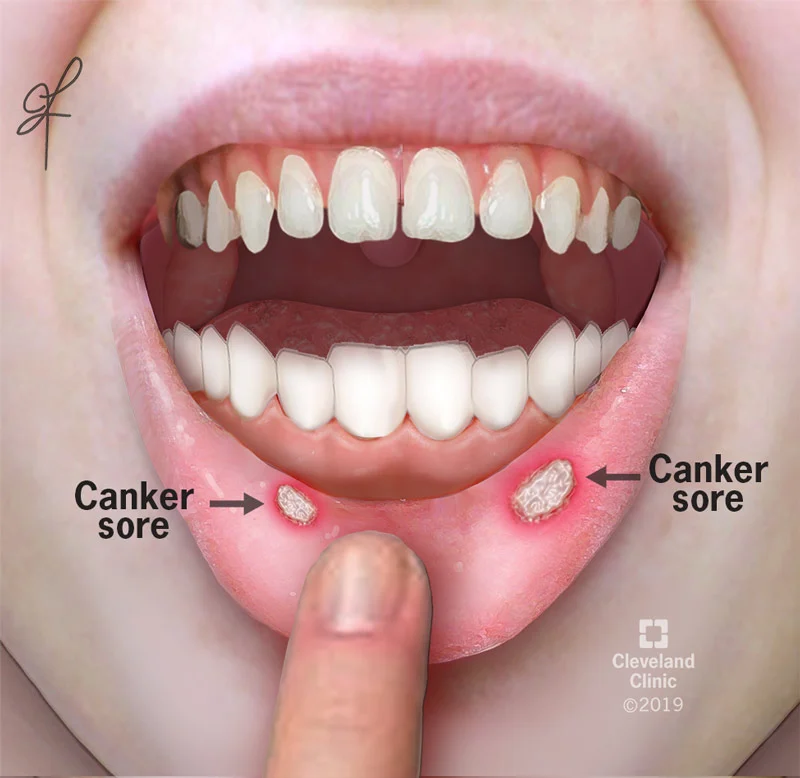Canker sores, also known as aphthous ulcers, are small, painful sores that develop inside the mouth. While they are not contagious or life-threatening, they can be uncomfortable and cause discomfort when eating, drinking, or talking. In this blog post, we will explore the causes, symptoms, and relief strategies for dealing with canker sores.
Causes of Canker Sores
The exact cause of canker sores is still unknown, but several factors can contribute to their development:
- Trauma or Injury: Accidental biting of the cheek or tongue, aggressive tooth brushing, or sharp food particles can cause trauma to the soft tissues of the mouth, leading to the formation of canker sores.
- Certain Foods and Substances: Acidic and spicy foods, citrus fruits, chocolate, coffee, and alcohol can irritate the mouth lining and trigger the development of canker sores.
- Stress and Hormonal Changes: Emotional stress, hormonal changes (such as those during menstruation), and a weakened immune system can make individuals more susceptible to canker sores.
- Nutritional Deficiencies: Lack of certain vitamins and minerals, such as vitamin B12, iron, folic acid, or zinc, can increase the risk of developing canker sores.
- Underlying Health Conditions: Certain health conditions, such as celiac disease, inflammatory bowel disease, or immune system disorders, may be associated with recurrent canker sores.
Symptoms of Canker Sores
Canker sores typically appear as round or oval-shaped white or yellowish ulcers with a red border. Some common symptoms include:
- Pain and Discomfort: Canker sores can be quite painful, especially when eating, drinking, or speaking. The level of discomfort can vary from person to person.
- Sensitivity to Spicy or Acidic Foods: Consuming spicy or acidic foods can worsen the pain and irritation caused by canker sores.
- Difficulty in Oral Hygiene: Brushing the teeth or using mouthwash can be challenging and painful when canker sores are present.
- Swollen Lymph Nodes: In some cases, canker sores may cause swelling of the lymph nodes in the neck.
Relief Strategies for Canker Sores
If you’re dealing with canker sores and need relief, there are several strategies you can employ. Start by avoiding spicy, acidic foods that can aggravate the sores. Use a soft toothbrush and avoid aggressive brushing to prevent further irritation. Rinse your mouth with a mild, over-the-counter mouthwash or a saltwater solution to soothe the area. Over-the-counter topical medications can also provide temporary relief from the discomfort.
If your canker sores are persistent, large, or extremely painful, it may be time to seek professional help. At Dentist Chaska MN, their experienced team is well-equipped to manage and provide advice on canker sore treatment. They offer a comprehensive range of oral health services and are committed to ensuring your comfort during each visit.
Relief Strategies for Canker Sores
While canker sores usually heal on their own within a week or two, several strategies can help alleviate symptoms and promote healing:
- Oral Rinses: Rinse your mouth with a saltwater solution or an over-the-counter antimicrobial mouthwash to cleanse the area and reduce bacteria. This can help relieve pain and promote healing.
- Topical Medications: Over-the-counter gels, creams, or ointments containing benzocaine or lidocaine can provide temporary pain relief. Apply them directly to the affected area as directed.
- Avoid Irritating Foods: Stay away from spicy, acidic, or rough-textured foods that can irritate the canker sores further. Opt for softer, bland foods that are easier to eat.
- Good Oral Hygiene: Maintain good oral hygiene by brushing gently with a soft-bristled toothbrush and using mild, non-irritating toothpaste. Avoid harsh mouthwashes that contain alcohol.
- Pain Relief: Over-the-counter pain medications, such as ibuprofen or acetaminophen, can help manage pain and reduce inflammation associated with canker sores. Follow the recommended dosage instructions.
- Avoid Triggering Factors: Identify any specific triggers that seem to cause canker sores for you. This could include certain foods, stressors, or lifestyle factors. Take steps to avoid or manage these triggers when possible.
- Stress Management: Practice stress management techniques, such as exercise, meditation, deep breathing, or yoga, to reduce stress levels and minimize the likelihood of recurrent canker sores.
- Nutritional Supplements: If nutritional deficiencies are suspected, consider incorporating foods rich in vitamins B12, iron, folic acid, and zinc into your diet. Alternatively, consult a healthcare professional about appropriate supplements.
- Prescription Medications: In severe cases or when canker sores are persistent, a healthcare professional may prescribe corticosteroids, topical medications, or oral medications to promote healing and manage symptoms.
It’s important to note that if canker sores persist for more than two weeks, increase in size, or are accompanied by other concerning symptoms, it is advisable to seek medical attention for further evaluation.
Canker sores can be painful and disruptive, but with proper understanding and care, their impact can be minimized. By avoiding triggering factors, practicing good oral hygiene, using topical medications for pain relief, and managing stress levels, it is possible to reduce the frequency and severity of canker sores. Consult a healthcare professional for further guidance on managing recurrent or persistent canker sores. With the right strategies in place, you can find relief from these pesky mouth ulcers.

